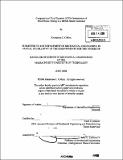Computational fluid dynamic (CFD) optimization of microfluidic mixing in a MEMS steam generator
Author(s)
Collins, Kimberlee C. (Kimberlee Chiyoko)
DownloadFull printable version (6.401Mb)
Other Contributors
Massachusetts Institute of Technology. Dept. of Mechanical Engineering.
Advisor
Carol Livermore.
Terms of use
Metadata
Show full item recordAbstract
The challenge of achieving rapid mixing in microchannels is addressed through a computational fluid dynamics (CFD) study using the ADINA-F finite element program. The study is motivated by the need to design an adequate mixing chamber for aqueous chemical reactants in a micro steam generator. The study focuses on the geometric optimization of a static micromixer channel by considering the trade-off between mixing quality and pressure drop. Both zigzag and straight channels are evaluated, in addition to channels with differing amounts of added obstruction features. Due to computational limits, the numerical analysis is conducted in two dimensions. The results indicate that hydrodynamic focusing of the reactant at the inlet, in addition to the amount and density of added obstruction features, has the most significant impact on mixing efficiency and increased pressure drop. The study presents mixing quality and pressure drop trends that provide useful information for the micro steam generator mixing chamber design.
Description
Thesis (S.B.)--Massachusetts Institute of Technology, Dept. of Mechanical Engineering, 2008. Includes bibliographical references (p. 23-24).
Date issued
2008Department
Massachusetts Institute of Technology. Department of Mechanical EngineeringPublisher
Massachusetts Institute of Technology
Keywords
Mechanical Engineering.